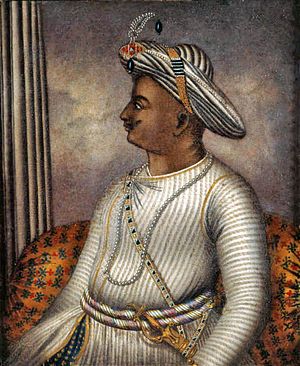In India, history is hardly ever neutral. Even bare facts and dates are often bones of contention. With the current atmosphere of tension and controversy on the role of Muslims in Indian society, some of the most contentious arguments over Indian history are those that seek to reevaluate the legacy of Islamic states in the subcontinent, largely at the behest of Hindu nationalists.
The latest controversy arose due to the decision of the southern state of Karnataka to celebrate Tipu Sultan Jayanti, or the birthday of Tipu Sultan, on November 20. Tipu Sultan was the Muslim ruler of the Kingdom of Mysore and has been lionized in the Indian nationalist, anti-colonial narrative for his steadfast resistance against the British, which ended with his death in 1799 during the Siege of Seringapatam. Tipu Sultan fought against the British in three different Anglo-Mysorian wars, the last of which took place because the British were afraid that the French emperor Napoleon, who had invaded Egypt in 1798, would link up with Mysore to undermine British rule in India. As a result, the 20th century Indian independence movement celebrated Tipu Sultan as a proto-independence “freedom fighter.”
However, Tipu Sultan’s legacy is not as simple or one-sided as many Hindu nationalists portray. Many of those who live in Mysore or Karnataka today have never thought of Tipu Sultan as anything other than a religiously intolerant tyrant, who extorted taxes and demolished Hindu temples in order to pay for his European-style army. After the controversy erupted over celebrating his birthday, politicians from all over India, mostly from the ruling Hindu nationalist Bharatiya Janata Party, have pointed to many negative aspects of Tipu Sultan’s rule, some more justified than others. One completely false claim argued he was “anti-national” because he invited the Afghan king Ahmed Shah Durrani to invade India in 1748. In fact, he was not even born at that time.
However, other claims that he was an “agent of the French” do strike closer to home. After all, given French colonial history and the earlier French presence in India, there is little reason to not believe that Napoleon might have been as inclined to establish an Indian empire as his British enemies were.
Tipu Sultan is especially notorious for his religious intolerance. He ordered the destruction of Hindu temples and Christian churches and forced conversions to Islam in many campaigns, especially in Coorg and the Malabar (modern Kerala). Specifically, Tipu Sultan “directed the slaughter of hundreds of Hindu prisoners of war and indulged in the forcible conversion of women and children [by] often forcibly marrying them to Muslim soldiers.” Modern secular nationalist authors tend to dismiss these actions as being only directed at defeated enemies and not at Hindus in general. The truth of the matter is a subject of serious and unresolved historical contention. In addition to religious issues, Tipu Sultan has been decried for replacing the local language, Kannada, with Persian, the literary language of the Islamic South Asian states at that time.
No matter how one looks at the record, it is true that Tipu Sultan’s father, Hyder Ali, informally usurped the throne of Mysore from the previous Hindu Wodeyar dynasty, where he served as a general. The Wodeyar dynasty had ruled Mysore since 1399, first as subjects of the Vijayanagara Empire and later as independent rulers after the fall of that state. Tipu Sultan formally deposed the Wodeyars and attempted to establish a new, Islamic dynasty in the heart of southern India, and, under his rule, Mysore reached its largest territorial extent. After the British victory over Mysore, the Wodeyar dynasty was restored and Mysore remained a princely state under the British Raj.
Ultimately, it is impossible to assess or construct events of the past through modern sensibilities and prejudices. Contemporary political movements will inevitably create controversies about the motives and actions of erstwhile rulers, especially in India, where both sides will go out of their way to either whitewash or demonize historical figures. With regard to Tipu Sultan, the historical record clearly demonstrates that like most rulers, he was interested in preserving his kingdom and power and is unlikely to have fought for a higher ideal that did not exist at that time, such as nationalism.
Tipu Sultan was clearly brave and ran his kingdom efficiently. At the same time, he was also a usurper, who often spoke in disparaging terms of Hindus and Christians. Therefore, like most Indian rulers, his is a mixed record that deserves neither some of the hysterical criticism coming from the right nor the blind exaltation and celebration coming from the left.

































